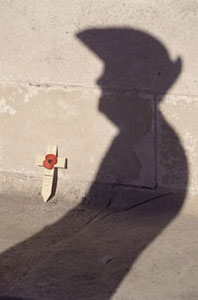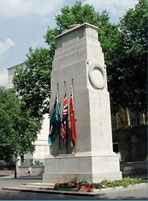 Remembrance
Day takes place on the second Sunday of November or the Sunday nearest
the 11th November. This is to commemorate the First World War which
ended at the eleventh hour on the eleventh day of the eleventh month
1918 (11 o'clock on the 11th November 1918).
Remembrance
Day takes place on the second Sunday of November or the Sunday nearest
the 11th November. This is to commemorate the First World War which
ended at the eleventh hour on the eleventh day of the eleventh month
1918 (11 o'clock on the 11th November 1918).
Armistice day, as it was then known (when the warring forces agreed to stop fighting) has been observed ever since. The First World War or Great War marked the beginning of the use of modern technology in warfare and led to millions of deaths. It was felt that the dead should be honoured and King George V initiated a 2 minute silence at exactly 11 o'clock to commemorate those who had died for their country.
In depth
Nowadays Remembrance Day is marked with a number of services and parades. The Queen, government representatives and soldiers march to the Cenotaph (empty tomb in Greek) in London and lay wreaths. A two minute silence is held to remember all those who have died for their country in the First World War and all wars since. The "Last post" is played on a bugle to introduce the two minute silence at 11 o'clock and "Rouse" is played at the end. Other commemoration services are held in churches and at war memorials throughout Britain.
Remembrance Day is also known as Poppy day. Poppy seeds which had lain dormant for many years in the battlefields in northern France bloomed with vigour after the earth was disturbed, becoming a symbol of new life and loss. A Canadian doctor called John McCrae posted to the front wrote a poem entitled "In Flanders fields" which served as the inspiration for people to wear artificial poppies as a sign of remembrance. These are now sold on behalf of The British Legion, a charity dedicated to supporting those serving in the armed forces and former soldiers. White poppies are also sold and worn as a sign of respect and as a symbol of peace.
VE (Victory in Europe) day marks the end of the second world war in Europe on the 8th May 1945. Massive celebrations took place in Britain - particularly London, where the civilian population exhausted by the austerity of domestic life in war torn Britain, enjoyed an excuse to party. This day is still commemorated as a reminder of those who died during the second world war.
In Flanders Fields

In Flanders fields the poppies blow
Between the crosses, row on row,
That mark our place; and in the sky
The larks, still bravely singing, fly
Scarce heard amid the guns below.
We are the Dead.
Short days ago
We lived, felt dawn, saw sunset glow,
Loved, and were loved, and now we lie
In Flanders fields.
Take up our quarrel with the foe:
To you from failing hands we throw
The torch, be yours to hold it high.
If ye break faith with us who die
We shall not sleep, though poppies grow
In Flanders fields.
John McCrae
Remembrance Day Q&A

Why do we have Remembrance Day?
The first Remembrance Day commemorated the end of the first world war. People wanted to remember the many millions who had died, so their deaths would not be in vain and the Great War would really serve as "the war to end all wars". Since then Remembrance Day has come to be an opportunity to honour and respect all those who have died for their country.
Why do people wear poppies?
When soldiers in the First World War in France saw poppies growing in the battlefields, they became a symbol of new life and hope for the future. Nowadays people wear artificial poppies as a sign of remembrance. The proceeds of the sale go towards supporting former soldiers. Some people wear white poppies which have become a peace symbol.
What was done to prevent another war?
After the second world war, the United Nations was set up to resolve conflicts peacefully. When an armed conflict takes place, it often sends out peacekeeping troops.
